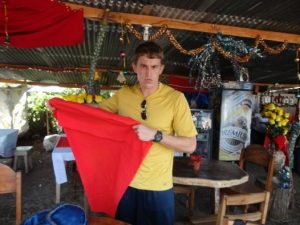 Adam first reached out to us a few weeks ago in anticipation of the release of his second book, “One Life Lived”. This story is an interesting one – detailing his unique adventures, cultural immersions and introspection about a year round the world trip.
Adam first reached out to us a few weeks ago in anticipation of the release of his second book, “One Life Lived”. This story is an interesting one – detailing his unique adventures, cultural immersions and introspection about a year round the world trip.
Adam’s first book was about how he randomly moved to a city in the USA by pulling a name out of a hat – arriving with $25, a sleeping bag and the clothes on his back. The challenge was to work and see if he could buy a car and have some savings after a year. A challenge he succeeded remarkably well at. Here is our interview:
Q. Tell us a bit about yourself and your background.
I played college basketball at Merrimack College, played professional basketball in Germany for about 36 hours, and then left to write my first book, Scratch Beginnings, a narrative of my experience living the American Dream. I have been speaking at high schools and colleges across the country since publication with the one year respite in the middle for me to travel around the world (which is my new book here, One Year Lived).
Q. In your recent book, “One Year Lived” one of the stories is your developing relationship with Ivana – a girl from Slovakia you met while volunteering. Can you give us an update on her – is she still in Slovakia, traveling – or has she moved to the USA?
She’s my wife now! And we live here in the USA. (I’m a very lucky guy.)
Q. Your writing is detailed and introspective – how much of the book was written based off notes you kept during the year abroad and how much was based upon reflections after the trip?
100% of the book was written while I was on the trip. I had the manuscript in hand when I returned home. This was very important, because I wanted to make sure that everything was completely accurate and factual rather than inventing scenes.
Q. What are some of the most valuable lessons that you learned from your time on the road?
That we, Americans, including myself are ignorant of what is going on in the world. And that you have to go there to know there, as Zora Neale Hurston writes in Their Eyes Were Watching God.
I think there is also a degree of compassion and humility that assembles over the traveler when he or she is on the road. There is this sense that the world really isn’t a small place and that you are just one tiny drop in it. And that lends perspective on one’s significance.
Q. Besides helping secure your safe passage at a border crossing on an expired visa (page 106) – what benefits and advice would you give someone interested in incorporating volunteer work into a vacation abroad?
Service is vital to the success of extended travel. If you are gallivanting from one place to another, seeing the sights and taking pictures, you’ll fail to recognize any kind of purpose to your journey. Traveling without volunteering is fine for a week or a month, but any longer and it’s necessary to get involved in a local community in some capacity.
My best advice is to start researching and reach out to a few organizations. There is an organization abroad that fits into the realm of what you’re trying to accomplish, but you have to put in the work to find them.
Q. I have to ask – what possessed you to take the stage in front of an audience and face yourself against angry bulls in a bull fighting ring (page 124)?
Ha. My mom would like to know the same thing.
I think you reach a point where you need to prove to yourself—and no one else—that you are capable of stepping outside of your comfort zone and that when faced with a challenge, “Dammit, I am the kind of person who steps up to face it!”
So, bullfighting was it for me. I knew that if I could get in that ring (and then also get out on my own two feet), I would be prepared to face many of the future challenges that I will confront in my life.
Q. You have to convince someone who has never been out of the country to travel: what advice/encouragement would you give them?
Unfortunately, many people do not understand how completely realistic a trip like this is. They here what I’ve said I’ve done, and they just think, “Meh, I could never do that because ____________________.” Which is a shame. I am only “different” and “unconventional” because I decided to actually go out and do it. That’s it.
It took time (2 years) to save and about 100 hours to plan. And I missed out on a few weddings while I was gone. So, does it require sacrifice? Sure. Is it worth it? Abso-frickin’-lutely.
Q. You wrote about an intriguing story in your first book, “Scratch Beginnings”. You moved to a new city with $25 dollars to spend, a sleeping bag and just your clothes. How did you overcome the fear of trying to make a go of it in this new city and step out of your “comfort zone” with almost next to nothing to start with?
Fear is internal. But if I’m able to bring it out, to externalize it, if you will, and observe that, “Hey, yeah, this is scary. But look at all of these other situations in the world. Plenty of stuff is scary!” it puts a different perspective on it.
So, my comfort zone can be a matter of my own shortcomings or limitations or it can be a matter of stepping “out” to see that in the grand scheme of things, I got it good (and comfortable).
For example, I can say: “Oh, man, I’m going to a new city with nothing but the clothes on my back. This is scary.” But then I think, “My goodness, there are people in this world who are facing far more trying matters than I am.
Does this mean that I am capitalizing on the tough times of others? Not at all. I’m simply saying, “If this guy next to me, who clearly has a far worse predicament than myself, can have a good attitude, then I have no excuse.
Q. You offer motivational speaking – what is the typical focus of these talks?
Well, piggybacking on the last question, I tend to focus my talks on stepping out into the world, whether that means into another neighborhood or another country.
Yes, it’s scary and uncertain, but that’s the excitement of it, that we have the opportunity to bolster our creativity and enrich our lives beyond sitting around in the place we’ve come from.
And I tell everything I have to say by sharing my own stories. Every motivational speaker can say the same thing, but it’s his or her stories that set him or her apart.
Q. Raleigh North Carolina is your hometown – the last time I visited Raleigh I toured a bunch of world class museums. What else do you recommend for visitors to the city, IE what – are some of your favorite activities and or places to visit?
Don’t leave town without eating at Bojangles. So, let’s start there.
I love the Raulston Arboretum (through NC State University). Really a cool place to go hang out. And have a picnic. (And if you can grab lunch from Bojangles and eat it at the Raulston Arboretum, you’re talking about a magical experience).
Downtown is a really fun place to hang out outside at a sidewalk café or restaurant. And this is only a recent (last five years or so) kind of thing. Raleigh has not been known for its social atmosphere, but that is changing.
And yes, museums. Our museum of art is world class, as you say, and so is the museum of history.
So, your itinerary for a day should be:
– Bojangles fried chicken at the arboretum
– Afternoon at the art museum
– Drinks and appetizers downtown
BIOGRAPHY:
Attending Merrimack College in North Andover, MA on a basketball scholarship, Adam Shepard graduated with a degree in Business Management and Spanish. Serving as a Resident Advisor during his upperclassmen years, he began to take particular interest in the social issues of our nation. Shortly after graduation—with almost literally $25 to his name—Shepard departed his home state for Charleston, SC, embarking on the journey that became his successful first book, Scratch Beginnings.
After a whirlwind journey that took his self-published book to the Today Show, CNN, Fox News, and NPR, he sold Scratch Beginnings to HarperCollins and made appearances on the Dave Ramsey Show and 20/20. He was likewise featured in the The New York Times, the New York Post, The Atlantic, and The Christian Science Monitor, and Scratch Beginnings has now been used on the curriculum or as a First Year Common Read at over 90 colleges and universities in the United States and translated across the world.
After a few years on the speaking circuit and working as the world’s slowest bartender, Adam set out in the world to spend all of the money he had been saving. The narrative of this experience exists here as One Year Lived.
In his spare time, he reads, plays tennis, and travels the country empowering audiences to elevate performance by taking initiative. His keynote speech What Will You Do Next? details strategies for capitalizing on both triumph and misfortune.

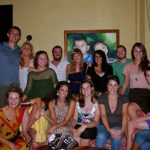

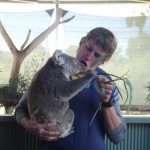
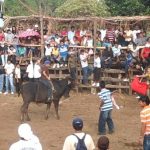


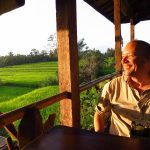
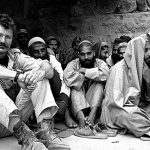

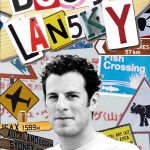

Very nice, Dave! Thank you for taking the time to interview me. These questions actually required some thought rather than throwing me a few softballs…
Great interview! Great answers and good points! Thanks for sharing, both of you!!! Success and all the happiness to you on your travels and best of luck with your book Adam!
And here I am still impressed by a young man I met at a book signing in Milwaukee Wisconsin. Hoping your life remains a life of wonderment and you still have kept what I call a “GEE WHIZ ” attitude. I am still a big Fan!!